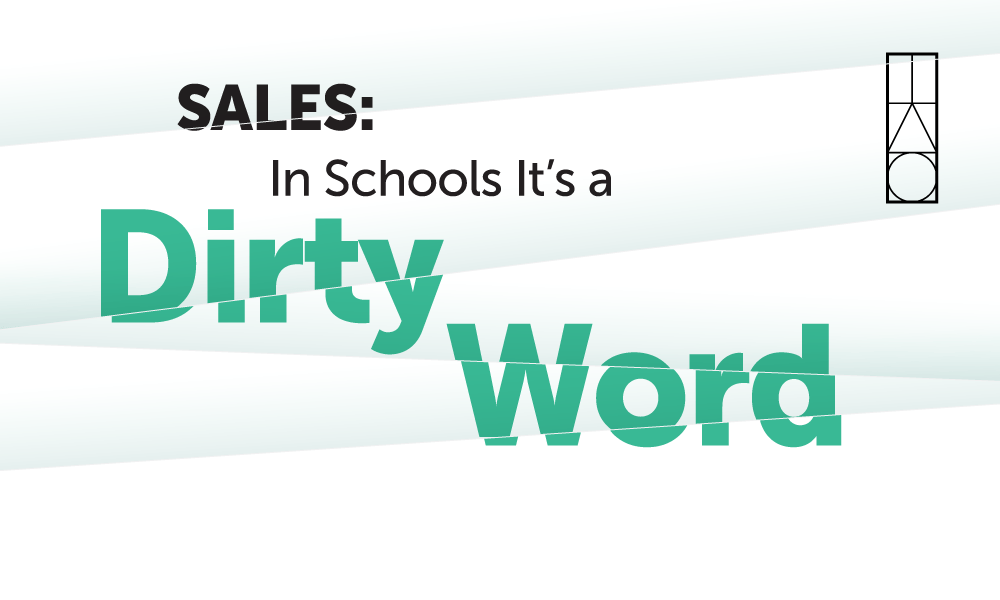This article is the second in a short series by Dr. Denry Machin on school admissions and marketing.
When you think of ‘sales’ or ‘selling’, what image comes to mind?
Daniel Pink, the New York Times bestselling author of ‘To Sell is Human’, posed a similar question. He asked people what word they most associate with sales. Of the 25 most common words, only five were positive. ‘Pushy’ was the most popular, followed by ‘yuck’, ‘annoying’, ‘slimy’, ’manipulative’ and ‘sleazy’.
Sales, it seems, is a dirty word.
To make it more palatable, sales often gets sugar coated. In business, it becomes Business Development, Customer Relations or Accounts Management.
In schools, it’s called Admissions.
It might be quite jarring to think of your Admissions staff as sales people, but that’s what they are. They may not be going door to door, they may not be trying to con people into purchasing a car with the mileage turned back from 100,000 to 10,000 and, hopefully, they are not pushy, manipulative, slimy or sleazy. But, they are in the business of sales.
Let’s consider why.
Sales, but not selling
Selling is part of marketing, but is distinct from advertising and other forms of promotion:
| Marketing | ||
|---|---|---|
| Advertising | AWARENESS | Magazines, newspapers |
| INFORM | Website and school brochures | |
| Promotion | INTEREST | Parents investigate the ‘enablers’: Curriculum, facilities, demographic mix, reputation, word of mouth, testimonials |
| DEMAND | Parents investigate the ‘deciders’: School tour, meetings with staff, ‘taster days’ | |
| Sales | ACTION | Enrolment processes |
Without advertising, you might not generate awareness. Without promotion, you may have little interest. Without ‘sales’, that awareness and interest won’t be turned into action. Hence, your Admissions staff being in the business of sales.
Another way to reflect on the importance of sales is to consider Customer Lifetime Value (CLV). For schools, CLV is annual fees multiplied by years of enrolment. So, a child joining you in Year 1 and staying through to graduation clearly has a high lifetime value. All things being equal, it would be easy to justify spending more on enrolling these children than those going into more senior years.
All things are not, of course, equal, and senior students bring marketing benefit in terms of examination results and prestigious university entrance, but the point remains, the higher the CLV, the more time, care, attention and expense you should be spending on enrolling these children.
An interesting comparison then would be how much you spend on advertising visa the amount you spend on Admissions. Every school envies a strong advertising campaign, but you should resist the temptation to compete in the endless contest for eyeballs. Advertising and glossy brochures do not automatically translate into more enrolments. Consider two identical schools. Neither has an advantage in terms of product differentiation but one has a better Admissions process. It is obvious which will be the more successful.
Your admissions staff do not need to become sleazy, pushy and annoying sales people. Hard sales is dubious at best; in education, it is morally abhorrent. However, thinking about your admissions process in terms of sales could generate useful benefits. For example, imagine how powerful it would be if every time you followed up with a potential parent you were able to mention something specifically relevant to them:
“By the way, the basketball game we saw on the tour finished in a win for us: 74–56. <Child name> seemed interested in the game, so I thought he might want to know the score.”
That’s not selling, that’s caring.
Given the level of fees charged by many private schools, and the CLV, the admissions process requires this kind of close personal attention.
The reality of contemporary private schooling is that parents are more demanding and the landscape more competitive than ever. In simple terms though, what every parent is looking for is help making the right choice for their child. If you can identify where they need help deciding and if you can address those needs, that is problem solving, not selling.
In particular, for schools, the idea of ‘closing a sale’ needs reframing. If you have followed the advice above then you have sold without selling. You can then finish the admissions process with a single powerful question:
“Do we offer what you need for your child?”
As well as showing that your priority is the child, how the parent answers will reveal multiple things:
- Whether you have addressed their concerns. If not, they just gave you the chance to do so.
- Whether or not their children are suitable for your school.
- How well your admissions process is filtering suitable applicants. Time saved on unsuitable applicants can be spent, and spent more wisely, on suitable ones.
- What you might need to do when following up with the parent providing more information, connecting them with a particular teacher or, as above, sending them the latest sports results.
Schools underestimate the importance of sales because of systematic efforts to hide it. Yet, the business of schooling is secretly driven by sales. The holy grail may be a school so great it ‘sells itself’ but, in competitive markets at least, this is a fallacy. We might prefer to call it ‘Admissions’, but the job is sales.
Critically, for schools, sales doesn’t mean hard selling it doesn’t mean conforming to the image of the sleazy and slimy sales person. It means understanding how a sales mindset can be used to tweak, improve and enhance your admissions process. You don’t want to be like the used car salesman, but maybe, just maybe, if you think a little different, sales isn’t a dirty word.
















 All Services
All Services


